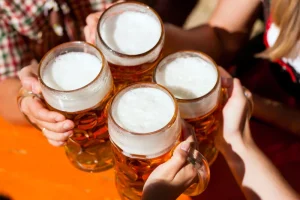
If someone believes that alcohol makes them more aggressive or gives them “liquid courage,” they may unconsciously fulfill this expectation, creating a self-fulfilling prophecy of sorts. Alcohol can act as a trigger, bringing buried feelings of resentment, insecurity, or pain to the surface. For some, drinking becomes a misguided attempt to cope with these emotions, only to find that it exacerbates the very issues they’re trying to escape. Distract them with safer alternatives or encourage them to rest. Mental state can affect decision-making around alcohol consumption. Those in a celebratory mood might drink more freely, while those feeling down might drink to cope with negative emotions.
Talk with your doctor about reducing alcohol intake
- It’s no secret that healthcare costs skyrocket for those frequently engaged in aggressive drunken behavior due to injuries or chronic health conditions stemming from excessive drinking.
- Increasingly, research offers answers to determine this interaction.
- There is indeed a link between drinking and domestic violence, but not the one that was previously suggested.
- Anger management and alcohol treatment programs must recognize and educate participants about the relationships between alcohol and anger.
- This might involve finding new hobbies, engaging in physical activities, or exploring sober social events.
- Continue reading to learn more about the link between alcohol and anger, including which risk factors exist, how alcohol-related aggression can be dangerous and more.
- They may hug friends frequently, express deep emotions, or become overly flirtatious.
When alcohol fuels aggression, it’s a tough situation for everyone involved. The first step in managing angry drunk psychology this issue is understanding that there’s no one-size-fits-all solution. It’s crucial to identify the reasons behind an individual’s angry outbursts while intoxicated and tailor an approach that fits their specific needs. Some of the biological factors that contribute to alcoholism may also play a role in increasing the risk of intimate partner violence. Such factors including head injury, neurochemistry, physiological reactivity, metabolism, and genetics. Among the many studied physiological and behavioral effects of alcohol is disinhibition, or reduced control over impulses or urges after intoxication.
How Does Alcohol Lower Inhibitions?

Hemingway drunks may face challenges recognizing problematic drinking patterns due to https://ecosoberhouse.com/ their apparent stability under the influence. Early intervention can prevent long-term health complications and improve overall quality of life. It’s essential to approach the situation with empathy and understanding, as stigma can often prevent individuals from seeking help. Suggest alternating between alcoholic and non-alcoholic beverages. This type often struggles with shame or denial about their drinking habits. They might go to great lengths to conceal evidence of alcohol use, such as hiding bottles or using breath mints.
Should You Forcefully Take Away Alcohol From a Raging Alcoholic Son/Daughter?

Continue reading to learn more about the link between alcohol and anger, including which risk factors exist, how alcohol-related aggression can be dangerous and more. By understanding how alcohol abuse influences your mood, you can learn to make positive choices instead of ones you may regret. If you live with underlying anger challenges, for example, it may not be as noticeable when you’re sober because your frontal lobe allows you to manage your emotions and your behaviors. When you drink alcohol, those inhibitions are lifted, and if you’re feeling angry, you’re more likely to express it and do so in an exaggerated way. Anger management and alcohol treatment programs must recognize and educate participants about the relationships between alcohol and anger.
How Does Alcohol Use Interact With Anger?

Genuinely express your concern for the person’s well-being Drug rehabilitation without using words that can insinuate that it’s their fault. Studies suggest that children who grow up in houses where one of the parents is an alcoholic are more likely to develop mental issues and engage in substance abuse. These conditions are easier to control or hide when the person is sober, but the loss of control related to alcohol consumption can make these conditions resurface. That said, not everyone who exhibits these behaviors necessarily fits into this category, as individual experiences with alcohol and anger can vary greatly. Consider cutting back or abstaining from alcohol, identifying triggers that make you angry, and practicing stress management techniques like meditation.
- Alcohol affects brain chemistry by altering neurotransmitters, which manage our mood and impulses.
- This might include friends who can help keep you accountable, or a designated “buddy” who can intervene if they notice you becoming aggressive.
- These alcoholic rage symptoms cause people to become violent and aggressive, even when the outlet is someone they seem to love or care about.
The Social Cocktail: Environmental Influences on Alcohol-Related Aggression

Mr. Hyde drunks may become confrontational, argumentative, or even violent. Their behavior often contrasts sharply with their sober personality, leading to strained relationships and potential legal troubles. Physical signs may include tolerance buildup, withdrawal symptoms when not drinking, and health issues related to alcohol consumption. Behavioral changes such as secretive drinking, mood swings, and prioritizing alcohol over other activities are also red flags. Secret drinking can be a sign of alcohol dependency or underlying personal issues.